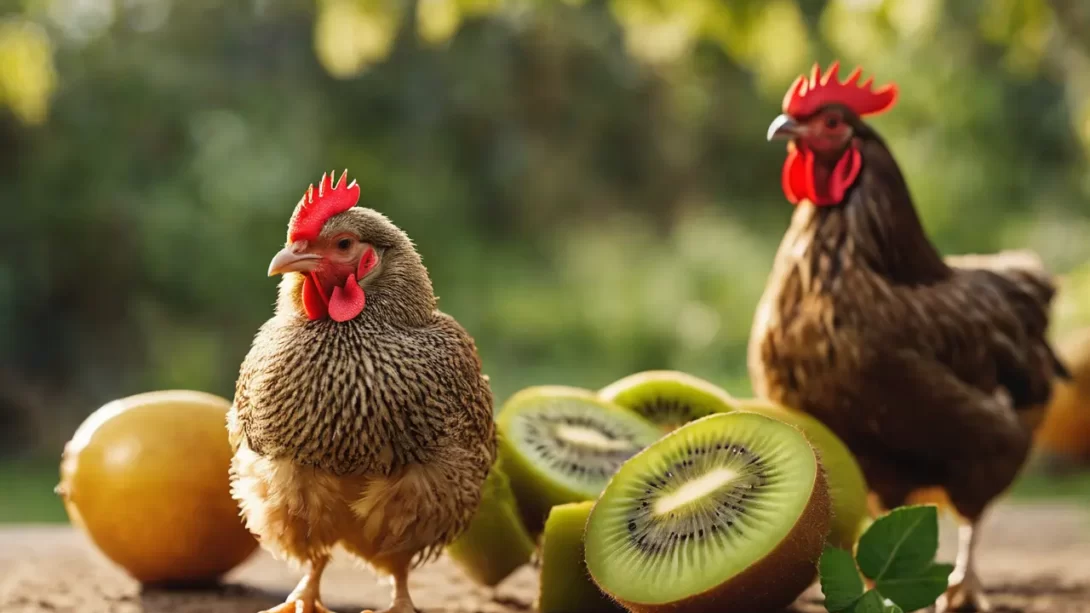Kiwi, a small fruit known for its vibrant green flesh and unique flavor, is more than just a tasty treat for humans. This nutrient-packed fruit can also be a delicious snack for chickens. However, before incorporating kiwi into your chickens’ diet, it’s important to understand its nutritional value and how it fits into the overall dietary needs of your poultry. This guide will explore the benefits and considerations of feeding kiwi to chickens, helping you make informed decisions for your feathered friends.
Nutritional Profile of Kiwi
Kiwi is a powerhouse of nutrients, boasting a rich content of vitamins, minerals, and dietary fiber. A single kiwi contains high levels of Vitamin C, essential for the overall health and immune function of chickens. It also provides Vitamin K, Vitamin E, potassium, and folate, among other nutrients. These elements play a crucial role in supporting various bodily functions in chickens, from blood clotting to muscle movement. Understanding this nutritional profile is key to recognizing how kiwi can benefit your chickens’ diet.
Benefits of Feeding Kiwi to Chickens
Incorporating kiwi into your chickens’ diet can have multiple health benefits. The high Vitamin C content in kiwi aids in boosting the immune system, which is crucial for chickens to ward off diseases. Antioxidants present in kiwi also play a role in preventing cellular damage, contributing to the overall well-being of the chickens. Additionally, the fiber in kiwi can aid in digestion, ensuring that your chickens maintain a healthy gut. These benefits make kiwi an excellent choice for a nutritious treat.
Potential Risks and Considerations
While kiwi is nutritious, there are some risks and considerations to keep in mind. Kiwi contains a small amount of sugar, which, if overfed, can lead to obesity and related health issues in chickens. The fruit’s acidic nature might also cause digestive upset if consumed in large quantities. Therefore, it’s crucial to introduce kiwi gradually into your chickens’ diet and observe their reaction. Moderation is key to avoid any potential negative effects, ensuring kiwi remains a healthy treat rather than a dietary staple.
Preparing Kiwi for Chickens
To safely introduce kiwi into your chickens’ diet, proper preparation is essential. Start by washing the fruit thoroughly to remove any pesticides or harmful chemicals. You can feed kiwi to chickens either peeled or unpeeled, as the skin is edible and provides additional nutrients and fiber. However, for chickens unfamiliar with kiwi, starting with peeled and chopped pieces can be more appealing. Offer kiwi in small, manageable portions to prevent choking and monitor their intake. A few pieces of kiwi once or twice a week is sufficient as a healthy treat.
Alternatives to Kiwi
Diversifying your chickens’ diet with a variety of fruits is beneficial for their overall health. Other safe and nutritious options include apples (without seeds), bananas, berries, and melons. Each of these fruits offers different vitamins and minerals, contributing to a well-rounded diet. Just like with kiwi, these fruits should be served in moderation as part of a balanced diet, which primarily consists of high-quality feed. Rotating these fruits as treats keeps the diet interesting for the chickens and ensures they receive a wide range of nutrients.
Conclusion: Kiwi in a Chicken’s Diet
Feeding kiwi to chickens can be a delightful addition to their diet, offering a variety of health benefits from its rich nutrient profile. It’s important to remember that while kiwi is a healthy treat, it should not replace a chicken’s primary diet of high-quality feed. The key is to provide kiwi in moderation as part of a diverse and balanced diet. This approach ensures your chickens enjoy the benefits of this fruit without any adverse effects.
In summary, kiwi can be a nutritious, immune-boosting, and enjoyable treat for chickens when introduced responsibly into their diet. By understanding the nutritional value of kiwi, preparing it properly, and serving it in moderation, you can safely incorporate this fruit into your chickens’ feeding regimen. Remember to always observe your chickens for any changes in behavior or health after introducing new foods. With these guidelines in mind, you can confidently add a little variety to your chickens’ diet, enriching their lives and enhancing their health with the goodness of kiwi.




